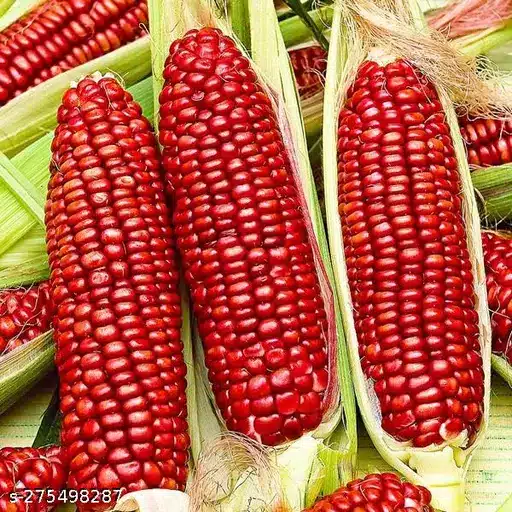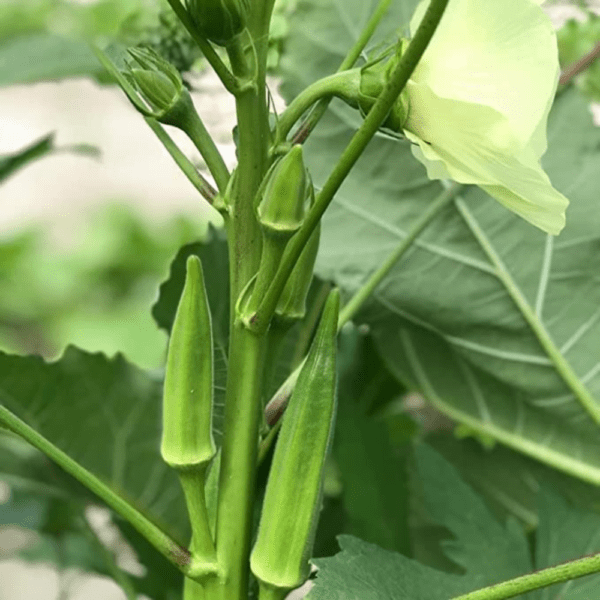Red Corn Indian Seeds
Red Corn Indian Seeds
Quantity: 40 seeds
Native red corn in India is a nutrient-dense, culturally significant, and climate-resilient crop that offers a variety of health benefits due to its rich content of antioxidants, vitamins, and fiber. While it plays an important role in local diets and sustainable farming practices, its cultivation is often limited to smaller, rural areas. There is increasing interest in preserving such indigenous crops for their health benefits and their role in agro-biodiversity conservation, helping to maintain the cultural and agricultural heritage of the regions where they are grown.
Red Corn Indian Seeds
Red Corn Indian Seeds
Native red corn, or “red maize” as it is often referred to in India, is a traditional variety of corn that has been cultivated for centuries in various parts of the country. While maize (corn) is widely grown across India, the red corn variety is particularly notable for its unique appearance, nutritional benefits, and cultural significance.
Key Features of Native Red Corn in India:
1. Appearance
- Color: The most distinguishing feature of red corn is its reddish to deep purple kernels. The color can range from a light red to a deep crimson or maroon, and in some varieties, it might appear more purple than red. This coloration is due to the presence of anthocyanins, a type of antioxidant pigment.
- Kernel Size and Shape: The kernels are generally smaller and rounder compared to the more common yellow or white maize varieties, but they can vary depending on the specific strain.
2. Nutritional Value
- Antioxidants: Red corn is rich in anthocyanins, which are potent antioxidants known for their health benefits, such as reducing oxidative stress, improving heart health, and potentially lowering the risk of chronic diseases.
- Higher Nutrient Content: Compared to regular corn, Red Corn Indian Seeds tends to have a higher concentration of vitamins (particularly Vitamin C), minerals, and fiber. The high antioxidant content is particularly beneficial for immune health.
- Carbohydrates and Protein: Like other corn varieties, red corn is a good source of carbohydrates and provides a moderate amount of protein. The fiber content is also higher, which can aid in digestion and promote gut health.
- Phytochemicals: Red corn is known for its high levels of phenolic compounds and other bioactive compounds that have various health-promoting effects.
3. Agricultural Characteristics
- Climate Adaptability: Red Corn Indian Seeds varieties in India are generally hardy and adaptable to different climates. They are typically grown in regions with moderate rainfall and can be cultivated in both dryland farming and irrigated conditions.
- Traditional Farming Practices: Many varieties are grown in small-scale farming systems using traditional methods, without the heavy use of chemical fertilizers or pesticides. This makes red corn suitable for organic farming practices and regions where sustainability is a key concern.
- Resilience: These varieties are often more resilient to pests and diseases than hybrid corn varieties, which helps farmers reduce their dependence on chemical treatments.
4. Culinary Uses
- Traditional Dishes: Red corn is used in a variety of traditional Indian dishes, often in rural areas. It can be ground into flour (known as makka atta) and used to prepare rotis (flatbreads), bhakris, or pancakes. It is also used in porridge or kheer (a type of sweet dish), making it an important part of local diets.
- Popcorn: In some regions, the red corn variety is also used to make popcorn.
- Fermented Foods: The corn is sometimes used in fermented products like chhaas (fermented buttermilk), or in alcoholic beverages like rice beer, which may incorporate maize.
- Animal Feed: Red Corn Indian Seeds is also used as livestock feed, providing a rich source of energy for animals, especially in rural farming systems.
5. Health Benefits
- Antioxidant Properties: The anthocyanins in red corn give it strong antioxidant properties, which can help neutralize free radicals in the body. This may help prevent oxidative damage to cells and tissues and contribute to overall health and longevity.
- Anti-Inflammatory Effects: Some studies suggest that the compounds in Red Corn Indian Seeds can have anti-inflammatory effects, which can benefit individuals with conditions like arthritis or other inflammatory diseases.
- Blood Sugar Regulation: Red Corn Indian Seeds, like other whole grains, has a lower glycemic index compared to processed corn, which means it can be a better option for individuals looking to manage their blood sugar levels.
6. Cultural Significance
- Traditional Farming Heritage: In many regions, especially in the states of Madhya Pradesh, Uttar Pradesh, Bihar, and parts of Himachal Pradesh, red corn is a part of the agricultural and cultural heritage. It is often grown alongside other traditional crops as part of sustainable farming practices.
- Festivals and Rituals: In some communities, red corn is associated with harvest festivals and rituals, where it is offered as part of offerings to deities or used in traditional ceremonies. It is sometimes considered a “sacred” crop, and its harvest is marked by specific customs.
7. Economic Importance
- Livelihood for Small Farmers: Native red corn is primarily grown by smallholder farmers, particularly in rural areas. Although it is not as commercially widespread as hybrid yellow corn, it plays an important role in the local economy.
- Market Niche: Due to its health benefits and unique properties, red corn is sometimes sold in niche markets, especially in organic or health-food stores. It is also used in the production of value-added products like health snacks and specialty flours.
Challenges and Conservation
- Limited Cultivation: Red Corn Indian Seeds is often grown in small quantities and may be overshadowed by hybrid corn varieties, which are bred for higher yields and easier handling. This can lead to a decline in the cultivation of traditional varieties.
- Loss of Biodiversity: With the spread of hybrid varieties, there is a risk that indigenous and heirloom crops like red corn may be lost over time. Conservation efforts are needed to preserve these traditional varieties, especially for their unique health and cultural benefits.
Conclusion
Native red corn in India is a nutrient-dense, culturally significant, and climate-resilient crop that offers a variety of health benefits due to its rich content of antioxidants, vitamins, and fiber. While it plays an important role in local diets and sustainable farming practices, its cultivation is often limited to smaller, rural areas. There is increasing interest in preserving such indigenous crops for their health benefits and their role in agro-biodiversity conservation, helping to maintain the cultural and agricultural heritage of the regions where they are grown.
| Weight | 25 g |
|---|---|
| Dimensions | 11 × 8.5 × 11 cm |







Reviews
There are no reviews yet.